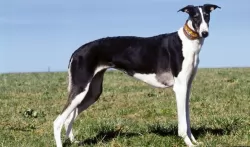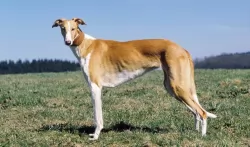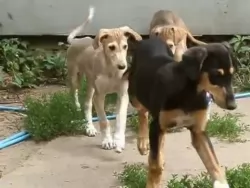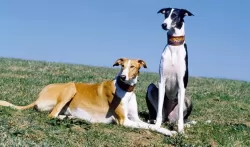 MyDogBreeds
MyDogBreeds Hungarian Vizsla is originated from Hungary but Chart Polski is originated from Poland. Hungarian Vizsla may grow 16 cm / 6 inches shorter than Chart Polski. Both Hungarian Vizsla and Chart Polski are having almost same weight. Both Hungarian Vizsla and Chart Polski has almost same life span. Both Hungarian Vizsla and Chart Polski has same litter size. Both Hungarian Vizsla and Chart Polski requires Low maintenance.
Hungarian Vizsla is originated from Hungary but Chart Polski is originated from Poland. Hungarian Vizsla may grow 16 cm / 6 inches shorter than Chart Polski. Both Hungarian Vizsla and Chart Polski are having almost same weight. Both Hungarian Vizsla and Chart Polski has almost same life span. Both Hungarian Vizsla and Chart Polski has same litter size. Both Hungarian Vizsla and Chart Polski requires Low maintenance.
 The Hungarian Vizslas existed in the land that is now Hungary, the Pannonian Basin, at least since the 10th century when they were shown on etchings. It is thought that their descendants were various pointers, the extinct Turkish Yellow Dog and the Transylvanian Hound. The Vizsla is a hunting dog with the word being Hungarian for pointer. In 1937 the Carmelite Friars under orders from King Louis I of Hungry. The breed was isolated for centuries in the Basin by the aristocracy and land owners.
The Hungarian Vizslas existed in the land that is now Hungary, the Pannonian Basin, at least since the 10th century when they were shown on etchings. It is thought that their descendants were various pointers, the extinct Turkish Yellow Dog and the Transylvanian Hound. The Vizsla is a hunting dog with the word being Hungarian for pointer. In 1937 the Carmelite Friars under orders from King Louis I of Hungry. The breed was isolated for centuries in the Basin by the aristocracy and land owners.
The Magyar people of the area developed the breed for hunting as both pointers and retrievers. They were excellent at hunting rabbits and water fowl. With a terrific sense of smell and boundless stamina and energy, the were prized as family and companion dogs as well. This was unusual for a hunting or working dog. Their size made them appealing as well. They were small by comparison to other hunting dogs both pointers and retrievers.
Easy to train, the Hungarian Vizsla works in water, forests and fields. They are able to retrieve in the water as well as on the land. Throughout their history, the breed outlasted the Turkish Revolution, the Hungarian Revolution World War 1 and World War 2, as well as the Hungarian People’s Republic Communist State. Things were a little dicey for the Vizlas several times beginning in the 1800’s when German Shorthaired Pointers and English Pointers were introduced into the area. The next time was after World War II. Fearful of what this Communist state would mean for the breed, some were smuggled into the United States and Austria.
At that time there were only a dozen or so Vizslas in all of Hungary. Their numbers were brought back from that small breeding stock. This history did result in several different strains grew into their own breeding stock. There are Vizslas in Czechoslovakia, Romania, Serbia and Austria. There developed separate lines that became separate breeds in the Wirehaired Vizsla and the longhaired Vizsla which is very rare.
After World War II, the Hungarian Vizsla came to the United States and the Vizsla Club of American was established as a first step toward AKC (American Kennel Club) recognition. This was attained in 1960. Rex del Geisimino came to the U.S. in 1951 and he was able to respond to commands in both German and Hungarian. Vizslas also came to the United Kingdom in this time frame. There are now about 4500 registered with the KC (Kennel Club of Great Britain). A Vizsla won the distinctive Crufts Dog Show in Great Britain, as Best in Show.
It is believed that this gentle, sensitive and affectionate hunter was part of the original breeding stock or the Wirehaired Vizsla, the Weimaraner and the German Shorthaired Pointers. The Hungarian Vizsla is intelligent and social. The need your attention as well as a lot of exercise to avoid destructive behavior born of boredom. They want to be with you and they can be very protective of you.
 The Chart Polski dog is a member of the Greyhound family and comes from Poland. He is an old dog breed dating way back to the 1600s.
The Chart Polski dog is a member of the Greyhound family and comes from Poland. He is an old dog breed dating way back to the 1600s.
The dog also goes by other names such as the Polish Sighthound and the Polish Greyhound. The dog looks quite similar to the English Greyhound and has been used as a hunting dog. With his exceptional speed, he has been able to run down prey.
The Chart Polski has always been seen in privileged classes, and after dying out to some extent, it became popular again in the 1970s. It is looked upon as a companion dog essentially while also still being used for hunting in Poland.
Today, the Polish Kennel Club as well as the Federation Cynologique Internationale, and the United Kennel Club recognize the breed.
 The Hungarian Vizsla has a light build, a short coat, and a distinctive bearing. They are medium in size and muscular, lean dogs looking a lot like the Weimaraner. They are also close in appearance to the Rhodesian Ridgeback and the Redbone Coonhounds. They are more muscular and leaner than the Rhodesian Ridgeback and Weimaraner.
The Hungarian Vizsla has a light build, a short coat, and a distinctive bearing. They are medium in size and muscular, lean dogs looking a lot like the Weimaraner. They are also close in appearance to the Rhodesian Ridgeback and the Redbone Coonhounds. They are more muscular and leaner than the Rhodesian Ridgeback and Weimaraner.
The Vizsla has a reddish nose and their nails and eyes should also be reddish or blending with the color of their coat. They have docked tails in the American standard but not in the United Kingdom, as docking is banned there. If he has a tail, you can see it flying through the air as he runs through the rough land to retrieve fowl.
They have a domed skull with a tapered muzzle that is shorter or equal to the skull. They have eyes that are contrasted with the coat and of medium size. The ears of silky, hang close to the face and the tips are rounded. The coat is rust in color with many shades. He also has a deep chest and hound like face.
 The Chart Polski looks similar to other sighthound breeds, and is a large breed, standing at between 68-80cm and weighing between 26 and 32kg. He is well muscled, slender and lean.
The Chart Polski looks similar to other sighthound breeds, and is a large breed, standing at between 68-80cm and weighing between 26 and 32kg. He is well muscled, slender and lean.
The face is typically long and narrow, although the muzzle is somewhat blunter than most sighthounds. His coat is short and sleek and can be in colors such as white, tan, black or a combination of these. His eyes are large and dark brown, the ears medium sized and narrow and usually folded back while the tail is long and curved at the tip.
The Chart Polski’s temperament is somewhat different to most sighthounds and he is thought to be more gentler and evenly tempered. He is loving and affectionate and will form a close bone with his human family.
He is confident, stubborn and strong-willed, and because he has been used for hunting, he has also got some aggressive tendencies towards other animals. He will need training and socialization to ensure he is good around other pets in the home as well as with children.
He becomes obedient and responsive with this training and socialization. He is a territorial breed, being protective around what he considers his own property and will make a good watchdog.
 Children friendliness - The Vizsla is very good with children.
Children friendliness - The Vizsla is very good with children.
Special talents - They are both excellent pointers and retrievers.
Adaptability - They are not very adaptable in living arrangements as they are much more suited for the country than the city.
Learning ability – The Vizsla is a very intelligent breed and easy to train. His learning ability is very high.
 Your Chart Polski or Polish Greyhound promises to be a loving, devoted pet that fits in well to a family that will give him good exercise and look after him well.
Your Chart Polski or Polish Greyhound promises to be a loving, devoted pet that fits in well to a family that will give him good exercise and look after him well.
He isn’t as gentle as other hounds and can therefore make a good watchdog too. He is territorial and wants to protect all those he regards as his own.
Train him and socialize him, and you will see that this intelligent, independent and self-confident dog can become obedient and also relaxed around people as well as other pets in the home, making him a splendid pet for those who admire these tall, slender dogs.
 The Hungarian Vizsla has a series of health issues that include:
The Hungarian Vizsla has a series of health issues that include:
 The Chart Polski can live to be 10 – 12 years when he gets his full quota of care in terms of good diet, exercise, love and care and a nice dry, warm place to sleep.
The Chart Polski can live to be 10 – 12 years when he gets his full quota of care in terms of good diet, exercise, love and care and a nice dry, warm place to sleep.
He isn’t known to have any specific health issues that could shorten his life, but by knowing about some of the common dog ailments there are, you can watch your pet and even prevent some risks.
People often think that bad teeth can’t do much harm, but tartar build-up can progress to gum disease, to the roots of the teeth and to damaging other parts of the body such as kidney-, liver- and heart.
Bacterial and viral infections are a threat to any dog, and rabies and parvo for instance can take your pet’s life. Remember that terrible diseases such as these can be prevented through having your dog vaccinated.
Dogs are open to getting all kinds of parasites inside- as well as outside on the skin. Hookworm, roundworm, fleas and ticks are examples of these parasites that can get into your pet’s system through dirty food,water and bites from mosquitoes. Some of these parasites can even be transmitted to you.
If your pet is in any way run down, get him to a vet immediately as there is an effective treatment.
 Feed two to four cups per day of a high quality dry dog food. Break this up into three or four meals. Don’t free feed your puppy.
Feed two to four cups per day of a high quality dry dog food. Break this up into three or four meals. Don’t free feed your puppy.
Feed two to three cups per day of high quality dry dog food. Feed in two servings.
The Vizsla is an athlete with high energy.
The Hungarian Vizsla needs at least 30 minutes of exercise every day and maybe more. He needs a large yard or open field, but daily brisk walks will do if that is all that is possible. He needs to be stimulated intellectually as well and enjoys fetch, jogging with you, lure coursing, field trials, tracking and scent work, confirmation, agility, barn hunt, dock diving, rally, and obedience.
 The Chart Polski was bred as a hunting dog and to run at top speed to bring down its prey. Today, he is tall and lean and still loves to run, and will therefore require a good deal of exercise.
The Chart Polski was bred as a hunting dog and to run at top speed to bring down its prey. Today, he is tall and lean and still loves to run, and will therefore require a good deal of exercise.
Don’t let his slender build deceive you because he is powerful and will need a walk every day and be given the opportunity to run. He will happily accompany you when you go running or cycling. Left un-exercised, he will become frustrated and aggressive and even destructive, so as a responsible dog owner, it is up to you to ensure he is well exercised.
The Chart Polski is a large breed puppy and they tend to grow fast at first. You want to make sure that he doesn’t put on weight too quickly as this puts them at risk for skeletal development problems later on such as hip- and elbow dysplasia. Speak to your veterinarian about feeding your puppy correctly so that he grows slowly, allowing his bones and joints to develop strongly and healthily.
Your adult Chart Polski will also need a special diet that caters for his size and energy levels. Remember to include some raw meat into his diet occasionally as well, as this will help him steer clear of dry, allergic skin conditions. Always ensure that he has access to fresh, cool water.
As a hunting dog, you’ll find the Chart Polski to require little grooming. No trimming or stripping is required for his short coat and you’ll simply need to brush him down twice a week.